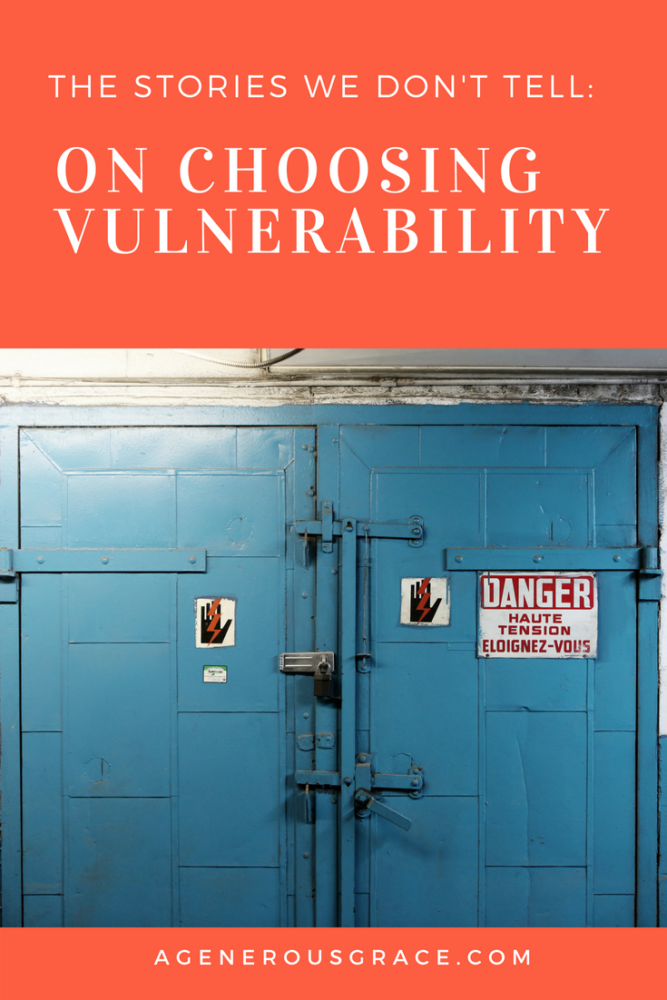
In college, I answered a youth crisis hotline one night a week. So many who called in were so…raw. Or embarrassed. Or afraid.
There was something freeing, I think, calling someone anonymously; at finally being able to share the invisible bag of stones they carried around, its weight occasionally flopping over their foreheads and making it hard to see anything else.
Fish Out of Water
I understand that more now. It’s been almost a year since we’ve moved back from Africa. But there are still so many times when I feel a bit like I’m in a game of Marco Polo in the pool as a kid: People around me are calling, “Marco!” And all I can do is be a fish out of water. I still feel that disconnect from the world around me, when it looks like most people are paddling around, having a great time.
What’s more is my new acquaintance with grief. Not only have I left the place I loved, the identity I knew, and friends welded to us through sweaty, dark, and beautiful days. I also witnessed and experienced for myself a lot of pain there in Africa. I’ve been irrevocably altered. And there are the things God didn’t choose to do while I was there; ways I feel such failure and loss.
I understand now that grief is often an isolating emotion. Even when we grieve in community, our experience of loss is unique as a retinal scan: What we have seen changes us.
Heart = Holy Ground
As my husband and I trained in conflict coaching, we were told that heart equals holy ground: That is, when people are sharing those intimate moments of the soul, know it is intensely sacred. It’s one of the reasons we quiet ourselves around people who are grieving, right? We listen rather than dealing out pat answers or squealing obliviously in our own delight.
In my own experience with loss, I’ve gotta acknowledge to myself that most people don’t know what questions to ask. My experience is as unique–weird, even–as if I had just stepped from Alice’s rabbit hole. I wonder things.
What if I share this, and someone doesn’t understand? What if I share what’s sacred, and a person has no idea how valuable it is to me? Or what if they don’t even ask?
Confession: I get a bit Scrooge-y with those experiences that feel so precious. I’m skittish about sharing them with anyone. (Consider this one of these “I’m not personally there yet” posts.) So in that vein:
Memos to Myself (and the Rest of Us)
-
Just because someone doesn’t completely understand doesn’t mean they can’t relate.
-
Find one person you can trust, and ask specifically if they’ll sit down with you, listen, and ask good questions.
After an accident in Uganda rattled me to the core, my husband asked me to find one friend who could simply take the time to listen. Interact. Receive my story. Ask good questions.
My friend was honored to be asked–and that time together was invaluable for our friendship and my ability to finally begin to push past something that could have broken me.
-
Eliminate some of the mind-reading and unspoken/unagreed upon expectations. Ask for what you need.
This was a killer piece of understanding we learned before we moved to Uganda and were telling our family. My husband longed for his dad to be onboard with our decision. But he wanted his dad to have the freedom not to be.
So he told his dad something like, I want to talk to you about something that’s really important to me. I would love for you to be excited, catch my vision, and dream a bit with me. You don’t have to. But I want to let you know what I’m hoping for.
It was a total win for my husband and for his relationship with his dad. Who knew asking for what you’re hoping for relationally could be so rewarding?
-
If you’ve been burned a bit by people not asking about you, not listening, misunderstanding, or giving that blank stare or token response, don’t give up altogether.
True, at times you may need to redraw your expectations for that relationship. But perhaps that person was having an off day, or needs you to communicate openly about how your friendship could grow. Or perhaps there’s another person you can trust.
-
High hopes for friendship aren’t bad.
Don’t let those hopes become demands. But having those desires, and certain standards of evaluation for whether a person can be trusted, aren’t bad–within reason.
-
Keep challenging yourself one step beyond your comfort zone.
Vulnerability is an act of bravery. And courage takes practice.
-
Numbing our negative emotions, explains researcher Brene Brown, doesn’t happen without numbing our positive ones, too.
“You cannot selectively numb,” Brown continues here. The more we don’t deal with our hurt, the more it affects our present-day happiness, contentment, and relationships. And it makes sense, doesn’t it? We get used to holding our selves back, at a distance from others and even from our own consciousness.
-
Sharing our story is often a significant first step to healing–finally.
That secret you feel you could never tell anyone is likely the bottleneck between your slavery…and your freedom. That abuse, that addiction, that loathing anger, that intense pain?
None of it has to determine your future. (Or mine.)
Like this post? You might like
- The Safe Place Series: #1 (Becoming a Friend Who Can Help), #2 (On Giving Pat Answers the Boot, and #3 (On Becoming a Person of Refuge)








2 Comments
Mel - 7 years ago
Beautifully and insightfully written.
Janel Breitenstein - 7 years ago
I know you get this in a real way, friend. Thanks for being someone who encourages vulnerability in my life!